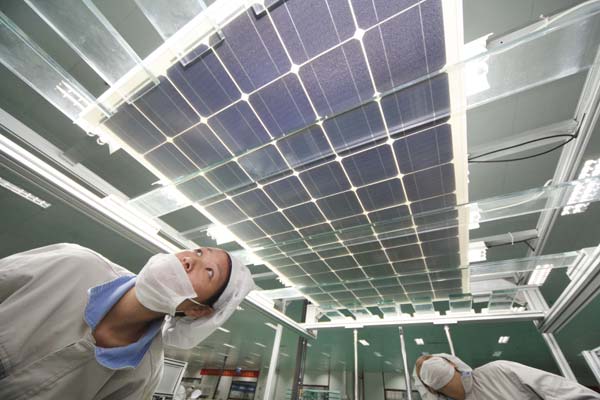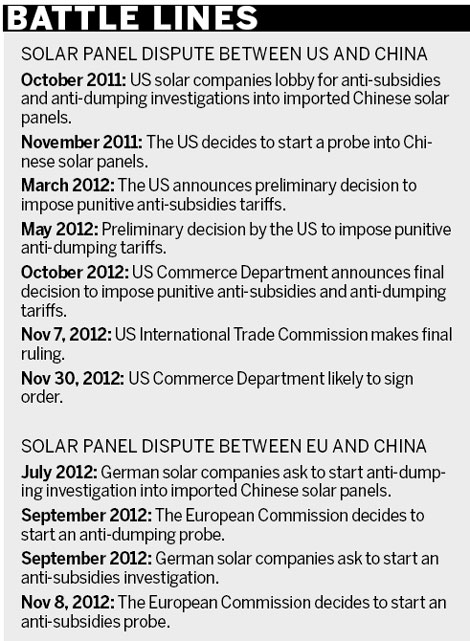EU starts subsidy probe of Chinese solar panels
Updated: 2012-11-09 07:50
By Du Juan in Beijing and Ariel Tung in New York (China Daily)
|
|||||||||||
Analysts say dispute will prevent progress in sector's development
The European Union announced on Thursday the start of an investigation into Chinese manufacturers of photovoltaic solar panels.
The action came a day after the US International Trade Commission determined that imports of Chinese photovoltaic cells and modules have hurt the US solar industry.
 |
|
Workers inspect a solar panel at Shanghai Shenzhou New Energy Development Co Ltd's production plant in Lianyungang, Jiangsu province. Si Wei / for China Daily |
Analyst said the decisions will lead to a trade war in the global renewable energy market, which will impede the development of solar energy technology.
The EU's investigation into whether the Chinese government gives subsidies to solar panel manufacturers comes after a separate European inquiry looked into charges that Chinese companies were selling photovoltaic solar cells into the European market below cost, a practice known as dumping.
The anti-subsidies case involves 21 billion euros ($27 billion), making it the largest case of its type initiated by the European Commission, the European Union's executive body.
The commission started on Sept 6 to investigate whether Chinese manufacturers have dumped solar panels on the EU market.

The two cases in Europe stemmed from complaints made by EU ProSun, an solar industry group led by Germany's SolarWorld AG.
The new anti-subsidies investigation is to last for 13 months, after which a ruling will be issued. The commission will then have nine months to decide if it will impose provisional anti-subsidy duties.
A day before the EU's announcement, the United States said it will impose punitive tariffs of up to 250 percent of the cost of photovoltaic solar panels imported from China over the next five years.
The tariffs, though, will not be imposed on solar modules that are assembled in China using cells purchased in a third country.
The US Commerce Department plans to officially sign off on that order on Nov 30.
TrinaSolar Ltd, one of the major solar panel producers in China, said it is assessing the US ruling, noting that it has the right to appeal.
"We do hope that the global market can continue to be open and everyone can afford to have green solar energy in the near future," said Miao Liansheng, president of Yingli Green Energy Holding.
"We are very disappointed about the US decision, which will slow the process of upgrading the technology used in the global solar industry and lead to decreasing investments in solar energy in the US," said Gao Jifan, chairman of the company.
China is already investigating US polysilicon, and the latest US announcement could "compel the Chinese government to further retaliate against US exports or to file a new World Trade Organization case against the US' own green subsidies", said Scott Lincicome, an international trade attorney at the law firm White & Case LLP. Lincicome is the author of a recent report written for the Cato Institute about US policies on countervailing duties.
"These duties, litigations and uncertainties are precisely what the struggling solar industry - in the US, China and elsewhere - doesn't need," he said.
Aaron Chew, a renewable energy analyst at the Maxim Group, a New York investment bank and asset management company, said a trade war between the US and China would greatly harm the solar industry.
"Whether you're talking about module makers or installers of solar panels in the US, Europe or China, obviously you don't want a trade war," Chew said.
"Ultimately, solar has to get its price down. This trade war is going to prevent solar from making any progress."
In general, solar tariffs are "a bad idea", said Tom Gutierrez, CEO of GT Advanced Technologies, which supplies equipment to manufacturers of solar panels. He said the only way the US and China can ease their trade tensions is to hold further constructive talks.
Contact the writers at dujuan@chinadaily.com and atung@chinadailyusa.com
Related Stories
Producers protest US trade duties on solar cells from China 2012-11-08 17:31
US to levy steep duties on Chinese solar products 2012-11-08 09:36
China takes EU solar dispute to WTO 2012-11-06 00:51
China launches probe into EU solar products 2012-11-01 14:55
Ray of hope for China's troubled solar industry 2012-10-29 14:14
Today's Top News
President Xi confident in recovery from quake
H7N9 update: 104 cases, 21 deaths
Telecom workers restore links
Coal mine blast kills 18 in Jilin
Intl scholarship puts China on the map
More bird flu patients discharged
Gold loses sheen, but still a safe bet
US 'turns blind eye to human rights'
Hot Topics
Lunar probe , China growth forecasts, Emission rules get tougher, China seen through 'colored lens', International board,
Editor's Picks

|

|

|

|

|

|





